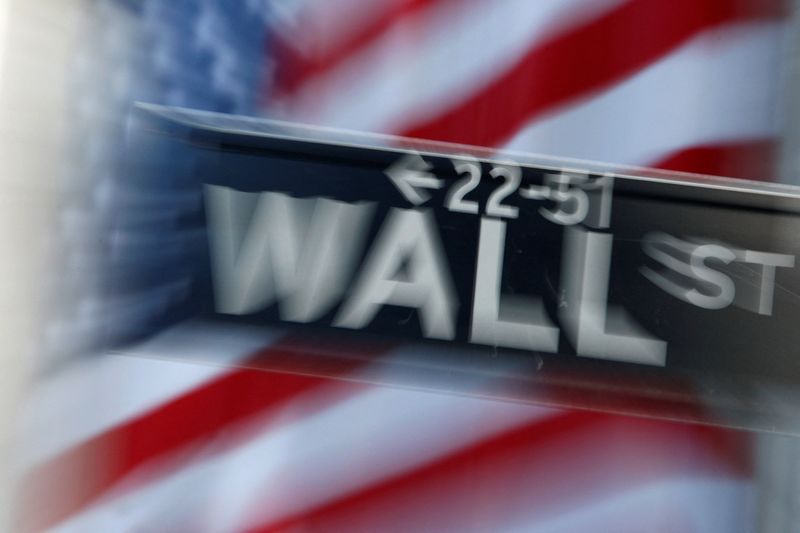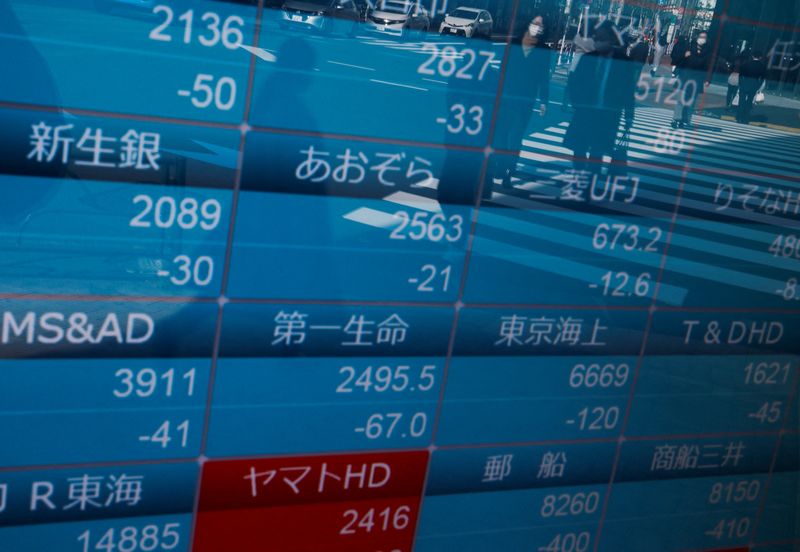By Chris Prentice and Marc Jones
WASHINGTON/LONDON (Reuters) - Big Tech gave major U.S. stock indexes a boost on Tuesday and European shares ended largely unchanged as a sharp fall in oil prices took the shine off bumper profits from oil company BP (NYSE:BP).
The euro retreated as the European Central Bank tried to cool interest rate hike expectations.
Wall Street shares shook off a groggy start and early losses as Apple Inc (NASDAQ:AAPL), Microsoft Corp (NASDAQ:MSFT) and Amazon.com Inc (NASDAQ:AMZN) jumped. Shares of bank stocks including Bank of America Corp (NYSE:BAC), JPMorgan Chase & Co (NYSE:JPM) and Wells Fargo (NYSE:WFC) added over 1% each ahead of a U.S. inflation reading due this week.
The Dow Jones Industrial Average rose 1.06% to end at 35,462.78 points. The S&P 500 gained 0.84% to 4,521.52.
The Nasdaq Composite climbed 1.28% to 14,194.46.
A jump in U.S. Treasury yields lifted bank stocks on Wall Street. Shares of Bank of America Corp BAC.N, JPMorgan Chase & Co JPM.N and Wells Fargo WFC.N all gained over 1%.
Europe's benchmark STOXX 600 finished flat with tech stocks among the weakest performers, pressured by rising bond yields. Oil and gas stocks sank 1.8%, tracking a drop in crude prices. FTSE-listed BP fell over 2% even after reporting a $12.8 billion annual profit. (EU)
The MSCI world equity index rose 0.52%.
"Earnings season has been top of mind for market participants for the past few weeks. Results have been, on balance, better than estimates," Art Hogan, chief market strategist at National Securities in New York, said in a note.
"As we wrap up the earnings season this week, investors focus will likely shift from the micro corporate earnings to the macro like the Federal Reserve, particularly pertaining to the pace of interest-rate rises and how to manage the balance sheet," Hogan added, pointing to expectations for as many as five Fed rate hikes.
LAGARDE COMMENTS
The euro weakened for a second straight day, pressured by comments on Monday from ECB President Christine Lagarde that there was currently no need for major tightening.
Currency and bond market traders are focused on which central banks will hike interest rates fastest and furthest this year following the rapid rise in global inflation.
The euro was down 0.21 percent, at $1.1418 by 4:25 p.m. EST (2125 GMT).
The dollar index, which tracks the greenback versus a basket of six currencies, gained 0.198 points or 0.21 percent, to 95.597.
The yen rose 0.34 percent, at $115.5100.
The benchmark 10-year U.S. Treasury yield hit its highest since November 2019 on Tuesday, ahead of a key inflation reading this week and expectations that the Fed will start tightening. [US/]
Three-year Treasury yields edged lower after a $50 billion auction.
"Central banks globally have all engaged in a hawkish pivot," said BlueBay Asset Management's David Riley. "As their tolerance for higher inflation persistently is less than previously signalled, we are shifting to a regime where there will be more macro volatility."
Germany's 10-year government bond yield, the benchmark of the bloc, rose 4.5 bps to touch its highest since January 2019 at 0.274%.
Italian government bond prices continued to underperform their peers, with the 10-year yield rising 7 bps to 1.880%.[GVD/EUR]
Graphic: Central bank balance sheets about to get a touch smaller- https://fingfx.thomsonreuters.com/gfx/mkt/znvnejxnmpl/CBANKS1.PNG
Facebook (NASDAQ:FB) owner Meta was down after billionaire investor Peter Thiel decided to step down from the company's board, extending its slide following Thursday's record plunge.
Pfizer (NYSE:PFE) fell 2.7%, clawing back the day's steepest losses seen as the drugmaker's forecasts for its COVID-19 vaccine and antiviral pills fell short of Wall Street estimates.
Asia's session was volatile overnight. MSCI's broadest index of Asia-Pacific shares ended flat overall but blue chip Chinese stocks dropped to a 19-month low after big tech firms' heavy losses and U.S. export warnings on 33 new Chinese firms. [.SS] (HK)
Russia's rouble reached a four-week high after marathon talks between President Vladimir Putin and his French counterpart Emmanuel Macron kept up hopes that war in Ukraine will be avoided.
Oil prices tumbled as investors surmised the resumption of indirect talks between the United States and Iran could revive an international nuclear agreement and allow more oil exports from the OPEC producer.
A deal could return more than 1 million barrels per day (bpd) of Iranian oil to the market, boosting global supply by about 1%. The nuclear talks resumed in Vienna on Tuesday.[O/R]
Brent crude futures finished down 2.1% at $90.78 a barrel, as U.S. crude oil futures settled down 2.1% at $89.36.

Gold prices advanced to a near two-week high on Tuesday, buoyed by mounting inflation concerns and Russia-Ukraine tensions, although expectations for a U.S. interest rate hike limited gains.
U.S. gold futures GCv1 settled up 0.37% at $1,827.90 per ounce. Spot prices were up 0.31%.
